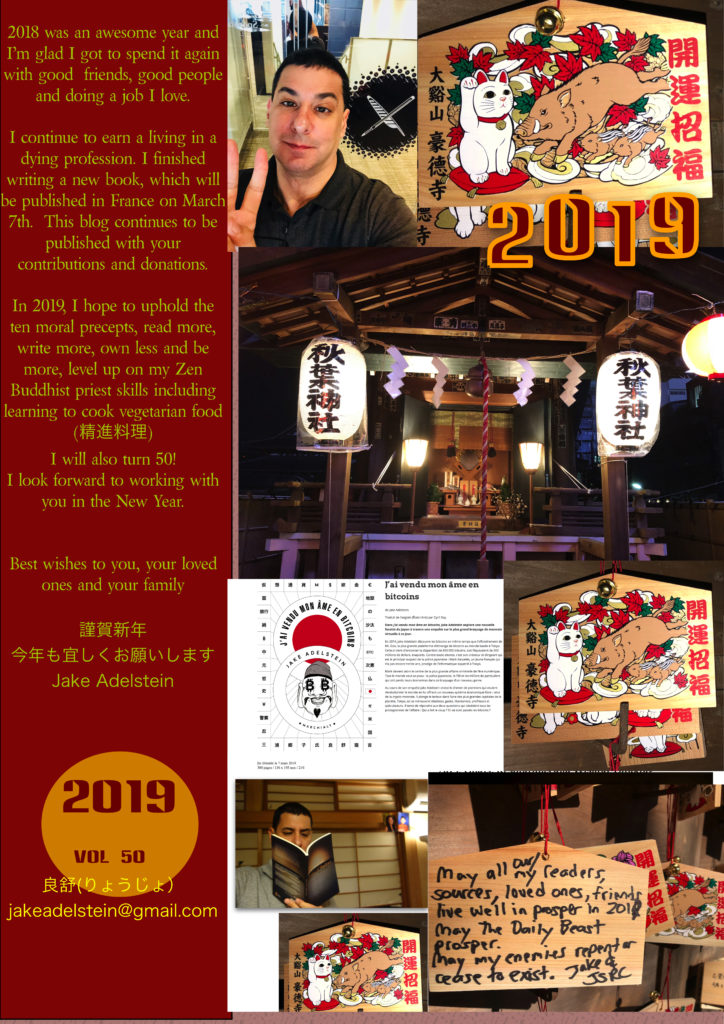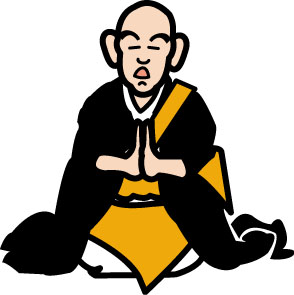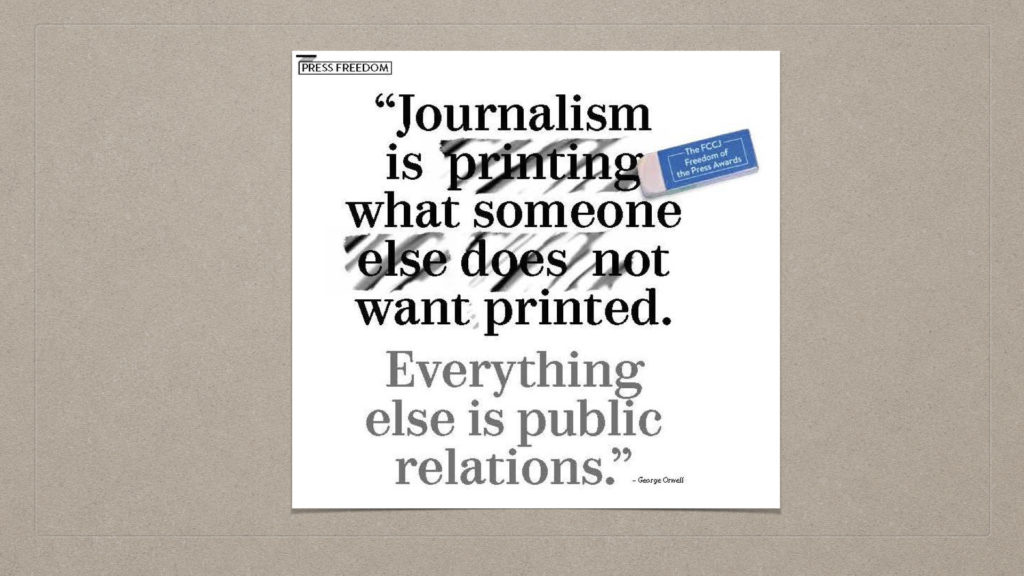Criticism is caring.

If you don’t address social problems or recognise they exist, nothing changes. I love Japan and many Japanese people are hard-working, honest, and polite. That doesn’t mean the society doesn’t have problems, such as child poverty, gender inequality, discrimination against: the handicapped, women, foreigners, especially Korean Japanese—powerful organised crime, nuclear dangers, staggering injustice in the legal system, repression of the free press, sexual assault on women with impunity for many assailants, rampant labor exploitation, death by overwork, and political corruption. Ignoring the problems doesn’t make them better. If you are offended by that, rethink your love of Japan.
The Japanese government has stated: “The Universal Declaration of Human Rights states that all human beings are born free and have the right to live with dignity. Many people in the world, however, are not able to enjoy their rights. The United Nations has thus engaged itself in activities to improve human rights situations. Japan strongly supports UN activities in the human rights field, believing that all human rights are universal”
Is it unfair to expect Japan to live up to its promises?

The argument that “It’s worse in XXX (China,North Korea, US) so it’s okay to have XXX (sexism/racism/fascism/wage slavery/death by overwork) in Japan” is silly. It’s like the accused in a murder trail arguing, “I should be declared innocent because I only killed one person in the robbery but my partner killed three.” Some things are never okay. Whataboutism is the last resort of the intellectually dishonest weasel. (Sorry kids).
I don’t think that the work we do is shouting to the wind. Every effort matters. Sometimes sarcasm is an effective tool. We try to be polite in our response to the comments but rudeness is sometimes met with rudeness. 親しき仲にも礼儀あり
Does any of our work make a difference? Yes.
Actually, in my time as a reporter, me being “Jake Adelstein”, on editing duty today–criticism of huge problems in Japan, via articles that I have written and written with others, resulted in better laws against human trafficking, comprehensive measures to deal with dioxin pollution, and the Japanese government recently admitting that there is a huge problem with exploitation of underage girls that needs to be dealt with.
I and many of the writers on this blog who live in Japan, love this country, and loving a country doesn’t mean remaining silent; it means speaking up about what is wrong, and correcting it. The effort doesn’t always work but sometimes it yields results. And people who can’t see any fault or social problems in their country or refuse to do anything about it or just as complicit in the rise “dark corporations,” greedy nationalists, death by overwork, exploitive enterprises, corrupt politicians, and the nuclear industrial complex that have done so much harm to the nation. For decades many warned of the dangers that TEPCO and its poorly managed nuclear power plants held. They were ignored. It doesn’t make them any less correct.
The battle to protect human rights, worker rights, equal rights, the environment, democracy, the public right to know, justice, gender equality and to fight poverty and end corruption are important struggles. All over the world. Japan is no exception.
I’m a Soto Zen Buddhist priest in training, which is a part of Japanese culture–surprise! I wouldn’t argue the metaphysics of Buddhism are true, but there are universal truths and there is a motto that I have as an editor and journalist and try to keep in my own personal life. Pardon the idealism but I believe this creed applies everywhere in the world.
So below is a modified version of our editorial policy, adapted from the Dhammapada (法句経). Thank you for your consideration.
Jake Adelstein, Japan Subculture Research Center, editor in chief
 Conquer anger with compassion.
Conquer anger with compassion.
Conquer evil with goodness.
Conquer trolls with humour & sarcasm
Conquer ignorance with knowledge
Conquer stinginess with generosity.
Conquer lies with truth

Those are exactly the words I was looking for.
By the way, I’ve read somewhere that no library in Japan has wanted to publish your book “Tokyo Vice”, which is, I think, a very sad thing. The ones who should the most read this book are the japanese. Don’t you want to release a japanese version on the internet ?
Thank you for writing in and correcting the typo!
I am glad to see that many others feel the same. There is an edition of the book out on Amazon Japan in Japanese–finally!
i totally agree with you. i’ve lived here a long time and i love this country but there are things that can be improved on. my big thing is traffic safety. it may not be the philiphines(scary!) but i just wish people would follow the bloody road rules. buckle your child in – duh! stop for pedestrians – hello! keep your head in-moshi moshi!!!
improved*
The idea that Japan is such a nice country but it would be even better if foreigners could tweak it to their liking smacks of neocolonialism, white man’s burden, and missionaries bringing Christianity to the heathens.
Actually, you’re the only one saying that. The Emperor, who I’m sure you respect, has lovely ideas about what would be good for Japan. And he’s a living God. Shall we quote?
“This year marks the 70th anniversary of the end of World War II, which cost many people their lives. Those who died on the battlefields, those who died in the atomic bombings in Hiroshima and Nagasaki, those who died in the air raids on Tokyo and other cities-so many people lost their lives in this war. I think it is most important for us to take this opportunity to study and learn from the history of this war, starting with the Manchurian Incident of 1931, as we consider the future direction of our country.It is my sincere hope that the new year will bring happiness to the people of our country and the people around the world.
I am one of those people who would rather do nothing than fix my own society. I’m glad that there are people who care like you in the world.
Ahhhhhh. You are my hero Mr Adelstein!
For years I have studied Japanese and this has naturally led to an interest in moving to Japan for work. But the more time I spend studying Japan and learning about it, the more I come to understand, the more wary I have become. The work culture and strange and scary ways women are treated in Japanese society scares me. And that’s just the tip of the iceberg. The more I know, the more I don’t want to move there – but at the same time the more I do want to, so that I can experience the problems the society faces for myself and work towards doing something about it.
It is heartening to know that there are people like you (and your team and associates!) out there leading the charge. Thankyou for existing and caring and doing the work you do. It renews my hope that it is possible for small groups and individuals to be the catalyst for change.
Thank you for the kind words. There’s a lot in Japan to like but there’s much that could be better.
Good afternoon, I enjoyed reading your books and often follow your writing online and in the Japan Times. I respect your insight and opinion on many of the Japan-related topics that you cover. However, in the past I’ve observed you criticizing men, both Japanese and otherwise, who involve themselves in “pick-up artist” culture and/or seduction science.
I can understand that there may be unseemly side to that topic, such as the Real Social Dynamics instructor who filmed himself sexually harassing women in Japan a few years ago. However, most men become interested in that topic because they are a failure with women. As the field of evolutionary psychology has shown with numerous and extensive academic research studies, there is an actual science to generating attraction in the opposite sex. So, if a man (or woman) finds themselves at a disadvantage with it, then it stands to reason as part of self-improvement that they would find people who are good at it (or claim to be good at it) and learn and apply the techniques and behaviors to increase their success at attraction.
Please don’t shame or bully men who study “game” or charisma/seduction science in order to improve their lives. The vast majority do so with the best intentions. Remember, the man who committed the Akihabara massacre, and others, have stated that their misogyny and murderous frustration was largely fueled by lack of success with women.
Dear Adelstein,
I have enjoyed some of your content in the past. But there is something that leaves a bad taste in my mouth and I feel compelled to say it.
Let the Japanese decide the future of Japan.
Ultimately, Japan is not yours to change.
In today’s increasingly globalized world, the Japanese themselves must decide to evolve, or their economy will suffer. Just as bars that say “No Foreigners” will likely run out of business within a generation.
It is okay to critique, but this attitude “if you love Japan, make it better” does not sit well with me.
Who are you to decide to impose your apparently superior Western ways? You may not realize it, but your concerns give off a vibe of Marxist class-conflict propaganda.
If you love Japan, it doesn’t mean to stand by as people get harassed in front of you.
Who among us would stand by silently as someone is being attacked in the streets? Certainly not you nor I.
Nonetheless, it is not yours to mold into your ideal. Nor is it mine.
It belongs to the Japanese.
I say this with respect, but with a tone of urgency.
Your Western ideals and Western approach is not necessarily better.
— Dante
Dante,
I’m a permanent resident of Japan. This is where I live and my children are Japanese citizens. Japan approved overwhelmingly a constitution that ensures basic human rights, popular sovereignty and pacifism as well as some measure of equality for all residents here in 1947. 住めば都. This is my home and I’ve often met Japanese people who support what I write and do. As a citizen, my civic duty is to make my society a better place and I’m espousing values that the majority of Japan still supports.
Japan was and still is a partially Buddhist country–and the values of Buddhism, often known as the ten precepts are fairly universal–and those values are kindness, generosity, reciprocity, and truth.
Your argument that your criticism of Japan is a reflection of your love for Japan is about as convincing as an anti-semite claiming that his/her criticism of Jews is a reflection of their love for Jews.
I’m Jewish and I still don’t get your point. Japan is a society with a constitution and laws and values. When it is wrong to ask a government to uphold the values it espouses? Nice ad hominem try but go back to debate school.
just a suggestion…..the Japanese have had a successful culture 4 many thousand yrs.
a nice white guy from the west will not change it with any altruistic western
‘cumbya’ ideals.
just like English colonialism…..the United states continues the tradition.
don’t be that colonialist.
Just a reminder–Japan has a constitution that most of the Japanese people support which guarantees basic human rights, ensures pacifism, popular sovereignty and freedom of the press. And to call those values “altruistic western ideas” is to essentially say that the Japanese people have no will of their own. There are universal values that the majority of the Japanese people support. Just as they approved a law guaranteeing gender equality. And championing those values in a democracy is what many Japanese people themselves in the press, in politics, and in protests are doing.
Thanks Jake for being you , writing your books and this blog, and standing up for intellectual integrity and understanding of both facts and culture. I wish you the very best. ~ Keith Dager, Los Angeles
Keith,
Thank you for taking the time to write in and express your support. I’m the intern editing today but I will tell Jake.
More than anything it’s the omnipresent and normalized sexualization of children that horrifies me about Japan. Japan really loves it’s infantile, kawaii things and that certainly is true about sex. I love looking at art on twitter, but going to a Japanese illustrator’s twitter is often a horrifying experience, because you pretty much always see art containing a hyper-sexualized girl, whose face looks like she is about 10. At this point, I feel traumatized by it and mostly just avoid Japanese illustrators on there because I just don’t want to see illustrated child porn and it’s everywhere and quite deeply disturbing. If it was niche it wouldn’t be as bad, but it appears to be openly accepted and enjoyed by a large swathe of people.
You make a valid point. It’s hard to know when this became the norm. There isn’t much scholarly study on it.